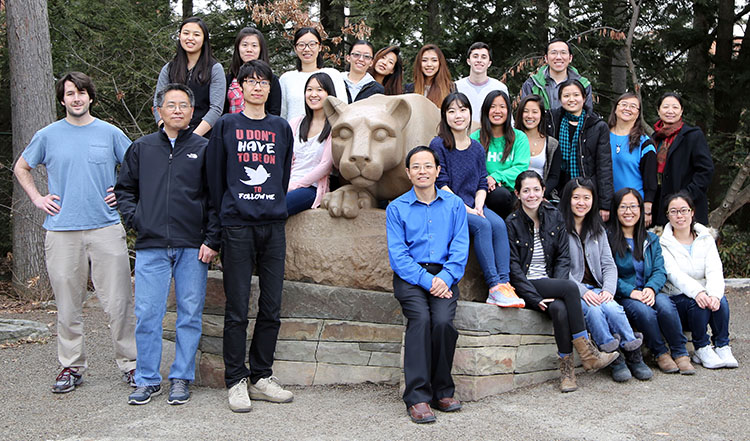BTN.com staff, April 26, 2015
More than 5 million Americans suffer from Alzheimer?s disease, and a new case emerges in this country at a rate of nearly once per minute. The upsurge in this illness has sparked a desire to fight back - especially among those who have lost loved ones affected by the disease and want to find a cure.
One of those people is Penn State men?s basketball coach Patrick Chambers, who watched his father struggle with Alzheimer?s during the final years of his life. He didn?t have to go far to find a valuable ally in the fight against this terrible affliction.
Chambers delivered a passionate speech about his father?s experience during a Walk to End Alzheimer?s event last year. While there, he saw a presentation given by Penn State biology professor Gong Chen, who?s spent the past few years developing groundbreaking technology that could save the lives of millions of Alzheimer?s patients.
The two of them connected at the event, and a friendship and partnership developed soon after. Chambers helped out with a video that Chen?s team produced to kick off a crowdfunding effort in support of their research. In that video, Chambers shared memories of his dad and explained why Chen?s work was so important.
?Here was the man that I looked up to; my hero that guided me, shaped me and helped me become the man that I am today,? Chambers said of his father. ?To see him in a state of weakness, in a state of forgetfulness, was quite challenging.
?We need to dump as much money as we can into research to beat this [disease] once and for all,? he added. ?We need a cure.?
And Chen?s research may provide exactly that. Specifically, he and his team of technicians and students have been looking into reversing the effects of Alzheimer?s by converting glial cells - which can regenerate and repair brain damage - into neurons, which are destroyed by the disease. Most of the testing so far has been performed on mice at Penn State?s Chen Lab.
?We have developed a revolutionary approach for reversing scarred tissues inside the brain back into normal neural tissue,? Chen explained. ?A big problem with classical stem-cell therapy is that the patient's body rejects the foreign cells. In contrast, our technology transforms glial cells from the patient's own brain to make new neurons. This is different because we do not use any external cells to inject into the brain.?
[btn-post-package]The crowdfunding initiative for the research, From Lab Bench to Bedside, launched last month with the goal of reaching $50,000 by the end of April. It received more than $12,000 in donations within the first 24 hours, and had over $35,000 at press time. Chen and his team plan to use the funds for technology and resources that will accelerate their lab research and allow them to shift test subjects in clinical trials from mice to people.
?I think this technology has really great potential to help people, and I wish we could work faster,? Chen said. ?People suffering from brain damage e-mail me from around the world asking for help, and it?s heartbreaking. I want to help them by delivering a therapy sooner.
?My ultimate goal is to develop a ?Neuro-Regeneration Pill? that can be delivered to Alzheimer?s patients,? he added. ?It?s exciting to imagine that, someday, patients may be able to take tablets every morning to regenerate new neurons in their brains. This is not just wishful thinking or science fiction - not anymore! Our technology is continuously improving, and I will not rest until we deliver it to our patients.?
And Chen is nothing but grateful for Chambers? involvement and the impact of his outreach.
?The message from Coach Chambers is very touching and powerful,? he said. ?I really thank him for supporting our research on Alzheimer?s disease.?
By Ashley Lemaine







